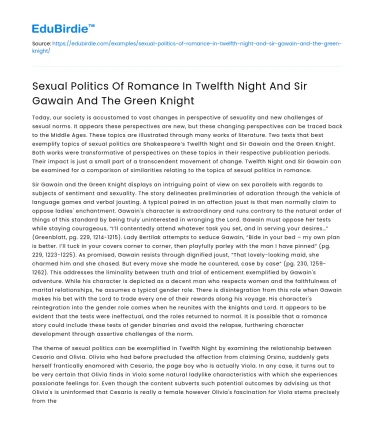Today, our society is accustomed to vast changes in perspective of sexuality and new challenges of sexual norms. It appears these perspectives are new, but these changing perspectives can be traced back to the Middle Ages. These topics are illustrated through many works of literature. Two texts that best exemplify topics of sexual politics are Shakespeare’s Twelfth Night and Sir Gawain and the Green Knight. Both works were transformative of perspectives on these topics in their respective publication periods. Their impact is just a small part of a transcendent movement of change. Twelfth Night and Sir Gawain can be examined for a comparison of similarities relating to the topics of sexual politics in romance.
Sir Gawain and the Green Knight displays an intriguing point of view on sex parallels with regards to subjects of sentiment and sexuality. The story delineates preliminaries of adoration through the vehicle of language games and verbal jousting. A typical paired in an affection joust is that men normally claim to oppose ladies' enchantment. Gawain's character is extraordinary and runs contrary to the natural order of things of this standard by being truly uninterested in wronging the Lord. Gawain must oppose her tests while staying courageous, “I’ll contentedly attend whatever task you set, and in serving your desires…” (Greenblatt, pg. 229, 1214-1215). Lady Bertilak attempts to seduce Gawain, “Bide in your bed – my own plan is better. I’ll tuck in your covers corner to corner, then playfully parley with the man I have pinned” (pg. 229, 1223-1225). As promised, Gawain resists through dignified joust, “That lovely-looking maid, she charmed him and she chased. But every move she made he countered, case by case” (pg. 230, 1259-1262). This addresses the liminality between truth and trial of enticement exemplified by Gawain's adventure. While his character is depicted as a decent man who respects women and the faithfulness of marital relationships, he assumes a typical gender role. There is disintegration from this role when Gawain makes his bet with the Lord to trade every one of their rewards along his voyage. His character's reintegration into the gender role comes when he reunites with the knights and Lord. It appears to be evident that the tests were ineffectual, and the roles returned to normal. It is possible that a romance story could include these tests of gender binaries and avoid the relapse, furthering character development through assertive challenges of the norm.
Save your time!
We can take care of your essay
- Proper editing and formatting
- Free revision, title page, and bibliography
- Flexible prices and money-back guarantee
The theme of sexual politics can be exemplified in Twelfth Night by examining the relationship between Cesario and Olivia. Olivia who had before precluded the affection from claiming Orsino, suddenly gets herself frantically enamored with Cesario, the page boy who is actually Viola. In any case, it turns out to be very certain that Olivia finds in Viola some natural ladylike characteristics with which she experiences passionate feelings for. Even though the content subverts such potential outcomes by advising us that Olivia's is uninformed that Cesario is really a female however Olivia's fascination for Viola stems precisely from the more ladylike attributes. Olivia's words enable an advanced crowd to peruse her as suspecting or in any event, realizing that Cesario is in truth a female, yet deciding to adore him/her in any case. Olivia's portrayal of Cesario's excellence both in the third demonstration and in their first experience, adulates ordinarily ladylike characteristics yet inquisitively doesn't scrutinize Cesario's sex. Olivia's examination of adoration to blame, “A murd’rous guilt shows not itself more soon / Than love that would seem hid” (pg.774, 144-145) further makes us wonder whether Olivia is blameworthy about her homoerotic interests. In addition, when Olivia announces that 'Nor wit nor reason can my passion hide' (pg. 774, 149), she may be alluding to same-sex love which in those occasions were viewed as against all rationale. The unconventionality of Olivia's fascination towards Viola makes her state that she has fallen into 'abatement and low price'.
Viola also shows homoerotic interests for Olivia. Although this part of her character is maintained a strategic distance from in many readings of the play, a close examination of the content can uncover that Viola also displays gay interests for Olivia. As the mediator between Orsino and Olivia, Viola ends up being a more effective man than Orsino. Viola fills the role of Cesario that she seduces Olivia. Viola is very straightforward as she lifted Olivia’s veil during their first meeting. She is likewise found energetically lauding Olivia's magnificence, “But, if you were the devil, you are fair” (pg. 754, 237). In a play where the hints of homoerotic interests are found in bounty, it would not be too fantastical to reason that every one of these viewpoints point to the homoerotic side in Viola.
The examples of Gawain’s fluctuation of gender role and Cesario and Orsino’s relationship make a solid contrast to help examine the theme critically. The reluctance of reintegration on the part of Gawain’s role is interesting and almost challenge Viola’s actions with her alter ego. This is an interesting point they both support the theme in different ways. The story of Gawain’s journey goes against the grain of chivalry and while also once challenging the male gender role. The issue with Gawain is that reintegration back into the norm at the end of his story; the disintegration is almost rendered pointless by this. The character of Cesario is the similar in the fact that there is a switched gender role. Viola reverts to her own persona by the end of the story, but it can be argued that Cesario was an effective man as any other.
Works Cited
- Greenblatt, Stephen, et al. The Norton Anthology of English Literature. W.W. Norton, 2018.






 Stuck on your essay?
Stuck on your essay?

